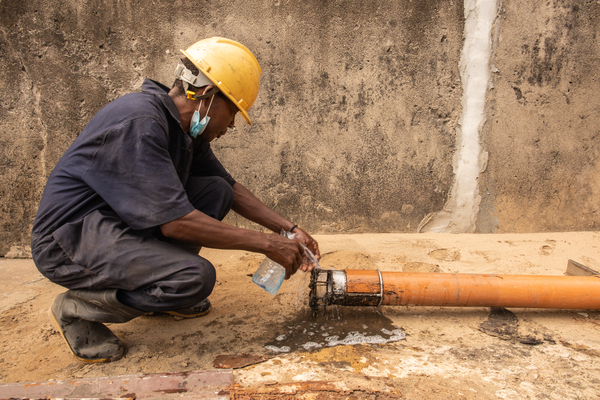April 2022 Are we supporting or suppressing sanitation workers? Mariam Zaqout (PhD Candidate, University of Leeds)
© WaterAid/ Basile Ouedraogo
April 2022 Are we supporting or suppressing sanitation workers? Mariam Zaqout (PhD Candidate, University of Leeds)
Mariam Zaqout discusses the appropriateness and effectiveness challenges of providing assistance to improve the livelihoods of sanitation workers in low and middle-income countries.
Promoting sanitation in low and middle-income settings has been a key priority for many governments and international development organisations. This has accelerated innovation in planning, technology, financing, and other aspects of delivering safely managed sanitation. Also, the continuous learning from providing sanitation has highlighted the need to accept and promote technology beyond conventional sewers to fit the condition of the more complex urban settings such as informal settlements. For instance, on-site sanitation has been promoted in several regions including South Asia and East Africa, which has prompted governments and development donors to prioritise safe handling and treatment of faecal waste (from on-site sanitation) through policy, infrastructure and supporting workforce involved - sanitation workers.
Pit emptying and other forms of faecal sludge handling, though it is considered illegal practice in many countries, is already a well-established profession in low- and middle-income countries. Promoting greater health, safety and dignity in this profession has become a priority area to many development organisations as well as governments including Bangladesh. Their efforts included recognition and inclusion of sanitation workers in planning sanitation service delivery, occupational health and safety of the job.

© WaterAid/ James Kiyimba
Many experiences included the formalisation of the profession mostly in the form of private entities like cooperatives (in Bangladesh) or employment contracts (social enterprises in Kenya). Formalisation and privatisation seemed the solution from the perspective of these international organisations to address the challenges of the job. However, this solution remains a small-scale effort that repeatedly struggles to scale or replicate mainly due to the financial aspect of expanding the service as well as the lack of support from the concerned public entities. The formalisation could therefore also suppress while supporting sanitation workers. Formalisation does not necessarily ‘resolve’ many of the issues related to the job, in fact many prefer to work informally.
While development organisations (both for profit and non-profit) presumably have good intentions to support people in this profession, their work remains problematic. First, their support is primarily to provide their service (safely managed sanitation) and offering better work conditions comes as a by-product. Indeed, it is a welcomed effort, but it does not attempt to address the persisting challenges and the implications of introducing new technologies and work arrangements. For instance, introducing Vacutug has led to job loss and navigating the job market is hindered by the social stigma associated with the job. Check my blogpost for more about this issue here.

© WaterAid/ CS Sharada Prasad/ Safai Karmachari Kavalu Samiti
Second, championing the effort of international organisations subtracts from support provided to the local initiatives that have more potential to provide sustainable solutions to better livelihoods for sanitation workers than international organisations. As the Secretary-General of the Septage Emptiers Association of Kenya puts it “International organisations like Sanergy and Sanivation have advantage of attracting resources at the international level. It is hard to compete with them for now”.
Just like the transformation toward adopting local sanitation solutions and not copying western solutions, local expertise to advocate and support sanitation workers should be championed and prioritised in order to achieve sustainable and equitable solutions for sanitation workers. The issue of representation of sanitation workers and ownership for related programmes was repeatedly discussed in the first Sanitation Workers Forum last year, you can learn more about it by watching the first thematic session about marginalisation and representation of sanitation workers. People discussed the current research and practice efforts and how it is still favouring the Global North perspectives and approaches to improve the profession. The role of international development organisations should not go beyond facilitating work and supporting the collective action of local advocates and organisations. Setting new standards and work arrangements for the local workers to follow will not be helpful if it is not fostered, accepted, and rounded in the everyday realities of the people concerned.
